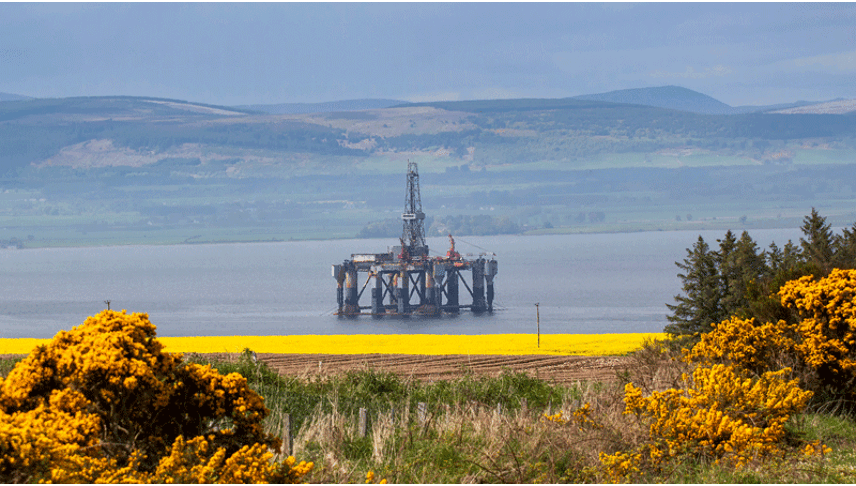Register for free and continue reading
Join our growing army of changemakers and get unlimited access to our premium content

Pictured: Oil rig in Cromarty Firth, Scotland
Back in January, MPs on the Environmental Audit Committee (EAC) published a report recommending a string of bold, short-term interventions to transition away from fossil fuel production and use in the UK. The report emphasised the social and economic benefits of doing so, amid the gas price crisis and with the potential for new green job creation in mind.
An official response from the Department for Energy Security and Net-Zero, published today (23 March), states that none of the recommendations will be taken on board at present. EAC Chair Philip Dunne MP has called the response “disappointing” and maintained that his Committee’s recommendations were “practical and achievable”.
On reducing fossil fuel production, the EAC had recommended a formal end date for new licences for oil and gas fields. A report published by the International Energy Agency (IEA) in 2021 concluded that any new fossil fuel extraction capacity, beyond that agreed by the end of the year, would jeapordise the transition to a net-zero energy system by 2050.
The EAC had also recommended, in the meantime, a ban on flaring in the North Sea, in a bid to cut methane emissions from the oil and gas sector. This recommendation was also made in Chris Skidmore MP’s Net-Zero Review. Since the EAC’s report, the IEA has confirmed that global methane emissions were only slightly below record levels in 2022, with most oil and gas firms failing to intervene despite the cost-effectiveness of doing so.
The Government will not be taking either of these recommendations on board. On flaring, the response argues that an outright ban is not the appropriate course of action. Instead, it will work, through the North Sea Transition Authority, to improve asset-level emissions data and to publish this data more frequently than the current rate of once per year. The response points to a commitment made by the industry to end routing flaring and venting by 2030.
On setting an end date for new oil and gas licencing, the response maintains that this is not necessary due to the ‘climate checkpoints’ which new projects and project expansions must comply with. This is despite the framework being criticised by environmentalists and by the Government’s own climate advisors.
The Government has maintained that a brief increase in oil and gas production would not derail the delivery of its legally binding, long-term climate targets – but result in a different pathway to their delivery.
The response also glosses over the EAC’s recommendation for growing clean energy other than the Conservative Party’s two technologies of choice – offshore wind and nuclear. MPs had recommended a specific ambition for expanding onshore wind. Additionally, the response shelves the recommendation for tax breaks for renewables investment, in line with those offered for fossil fuel firms since last year, to increase investor confidence in UK renewables.
One more chance at climate credibility
The EAC’s report looked at reducing fossil fuel use as well as fossil fuel production.
MPs recommended a new target for t least one million energy efficiency installations in UK homes annually by 2025, increasing to 2.5 million homes annually by 2030. Funding for this work could be derived, in part, from the Energy Profits Levy, the EAC stated.
The response maintained that the Chancellor’s commitment to £6bn of additional energy efficiency funding post-2025, combined with grants on offer to decarbonise some homes and public sector buildings in the meantime, are sufficient.
Summarising the response, Dunne said it “reiterated existing policy initiatives” which, “in themselves, are clearly insufficient to accelerate emissions reductions at a pace necessary to put us firmly on the path to net-zero”.
The Climate Change Committee’s most recent annual progress report to Parliament concluded that the UK Government only has “credible” plans to deliver one-third of the emissions reductions it is legally committed to by 2050. Improving the energy efficiency of buildings and industry is a particular weak point, the report stated.
Indeed, the UK’s flagship Net-Zero Strategy was ruled ‘unlawful’ by the High Court last year, on the grounds that the policies detailed will not result in the levels of deep decarbonisation the Government is legally committed to. The Government must provide a response by the end of March, and is reportedly planning to do so next week, on the same day as publishing a full response to the Net-Zero Review. Government sources and environmental groups are referring to this upcoming event as ‘Green Day’.
Dunne said Green Day presents “another chance for the Government to demonstrate its ambition”.
“This comes at a pertinent time following the Intergovernmental Panel on Climate Change’s recent warnings that the world is likely to breach the Paris goals of 1.5C additional warming in the 2030s: we must rapidly identify ways to reduce consumption of fossil fuels yet further,” Dunne said. “I expect that in the light of these significant announcements, Ministers will wish to update the Government’s response to our recent report.”


Disgusting. Make them suffer at the polling station.